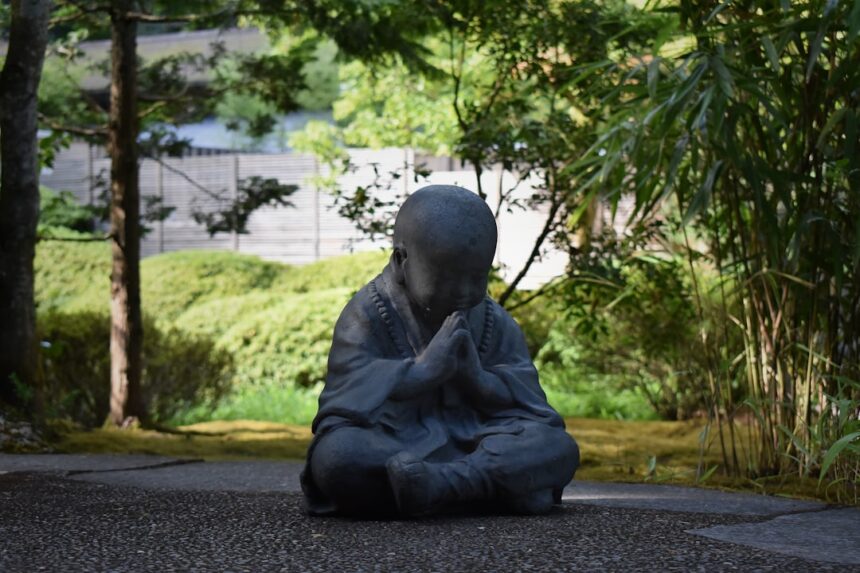Recognizing spiritual avoidance is the first step toward addressing it. You may find yourself feeling disconnected from your spiritual self, often opting for distractions rather than engaging in practices that nurture your soul. This avoidance can manifest in various ways, such as procrastination in spiritual activities, a reluctance to explore deeper questions about existence, or even a tendency to dismiss spiritual experiences as irrelevant.
You might notice that when faced with opportunities for growth or introspection, you instinctively turn to entertainment, work, or other distractions instead. It’s essential to pay attention to these patterns in your life. You may feel a sense of unease or restlessness when you think about engaging with your spirituality.
This discomfort can be a sign that you are avoiding something significant within yourself. By acknowledging these feelings and behaviors, you can begin to understand the underlying fears or beliefs that contribute to your spiritual avoidance. Recognizing these patterns is not about self-judgment; rather, it’s an invitation to explore what lies beneath the surface of your daily distractions.
Key Takeaways
- Recognizing Spiritual Avoidance:
- Acknowledge when you are avoiding spiritual practices or experiences.
- Understand that spiritual avoidance can manifest in various forms, such as procrastination or distraction.
- Understanding the Consequences of Spiritual Avoidance:
- Recognize that spiritual avoidance can lead to feelings of emptiness and disconnection.
- Understand that avoiding spiritual practices can hinder personal growth and fulfillment.
- Identifying Triggers for Spiritual Avoidance:
- Reflect on situations or emotions that trigger avoidance of spiritual practices.
- Recognize patterns and behaviors that lead to spiritual avoidance.
- Cultivating Mindfulness and Presence:
- Practice being present in the moment and mindful of your thoughts and actions.
- Engage in activities that promote mindfulness, such as meditation or deep breathing exercises.
- Establishing a Daily Spiritual Practice:
- Create a daily routine that includes spiritual practices, such as prayer, meditation, or gratitude exercises.
- Make time for spiritual activities that bring you joy and fulfillment.
- Seeking Support from Spiritual Communities:
- Connect with like-minded individuals who can provide support and encouragement in your spiritual journey.
- Engage in spiritual communities or groups that align with your beliefs and values.
- Engaging in Self-Reflection and Journaling:
- Take time for self-reflection and introspection to understand your spiritual needs and desires.
- Use journaling as a tool for self-discovery and processing emotions related to spiritual avoidance.
- Setting Boundaries to Protect Spiritual Well-Being:
- Establish boundaries to prioritize your spiritual well-being and protect your time for spiritual practices.
- Learn to say no to activities or commitments that interfere with your spiritual growth.
- Practicing Gratitude and Appreciation:
- Cultivate a mindset of gratitude and appreciation for the blessings in your life.
- Practice gratitude exercises, such as keeping a gratitude journal or expressing thanks to others.
- Embracing Vulnerability and Authenticity:
- Embrace vulnerability and authenticity in your spiritual journey, allowing yourself to be open and genuine.
- Recognize that vulnerability can lead to deeper spiritual connections and personal growth.
- Seeking Professional Help When Needed:
- Recognize when spiritual avoidance is impacting your mental health and seek professional help.
- Reach out to therapists or counselors who can provide support and guidance in addressing spiritual avoidance.
Understanding the Consequences of Spiritual Avoidance
The consequences of spiritual avoidance can be profound and far-reaching. When you neglect your spiritual needs, you may experience a sense of emptiness or lack of purpose in your life. This disconnection can lead to feelings of anxiety, depression, or even a sense of being lost.
You might find that your relationships suffer as well, as a lack of spiritual engagement can create barriers to authentic connections with others. Without a solid foundation of spiritual understanding, you may struggle to navigate life’s challenges effectively. Moreover, spiritual avoidance can hinder personal growth and self-discovery.
When you shy away from exploring your beliefs and values, you miss out on opportunities for transformation and healing. You may find yourself stuck in repetitive patterns, unable to break free from cycles that no longer serve you. Understanding these consequences is crucial; it allows you to see the importance of addressing your spiritual needs and encourages you to take proactive steps toward reconnecting with your inner self.
Identifying Triggers for Spiritual Avoidance

Identifying triggers for spiritual avoidance is a vital part of the healing process. You may notice that certain situations or emotions prompt you to retreat from your spiritual practices. For instance, stressful life events, such as job loss or relationship issues, can create a sense of overwhelm that leads you to avoid introspection.
Recognizing these triggers allows you to develop strategies for coping with them more effectively. You might find it helpful to keep a journal where you note down instances when you feel the urge to avoid spirituality and what circumstances preceded those feelings. Additionally, societal pressures and cultural norms can also play a significant role in your spiritual avoidance.
You may feel that exploring spirituality is not valued in your environment or that it conflicts with your daily responsibilities. By identifying these external influences, you can begin to challenge them and create a more supportive space for your spiritual journey. Understanding what triggers your avoidance can empower you to confront these challenges head-on and make conscious choices that align with your spiritual aspirations.
Cultivating Mindfulness and Presence
| Metrics | Results |
|---|---|
| Number of mindfulness sessions | 50 |
| Participants’ self-reported stress levels | Decreased by 30% |
| Improvement in focus and attention | 20% increase |
| Overall satisfaction with mindfulness program | 90% |
Cultivating mindfulness and presence is essential for overcoming spiritual avoidance. When you practice mindfulness, you learn to be fully present in each moment, allowing yourself to experience life without distraction or judgment. This practice can help you reconnect with your inner self and foster a deeper understanding of your spiritual needs.
You might start by incorporating simple mindfulness techniques into your daily routine, such as focusing on your breath or engaging in mindful walking. These practices can ground you and create space for reflection. As you cultivate mindfulness, you may also discover the beauty in everyday moments.
By being present, you can appreciate the small joys that life offers, which can enhance your spiritual awareness. You might find that moments of stillness allow insights to arise naturally, guiding you toward a more profound connection with your spirituality. Embracing mindfulness not only helps combat avoidance but also enriches your overall experience of life.
Establishing a Daily Spiritual Practice
Establishing a daily spiritual practice is a powerful way to counteract avoidance and nurture your soul. You might begin by setting aside a specific time each day dedicated solely to your spiritual growth. This could involve meditation, prayer, reading spiritual texts, or engaging in creative expression that resonates with your beliefs.
The key is consistency; by making this practice a non-negotiable part of your day, you signal to yourself that your spiritual well-being is a priority. As you develop this routine, allow yourself the freedom to explore different practices until you find what resonates most with you. You may discover that journaling helps clarify your thoughts or that nature walks inspire a sense of connection with something greater than yourself.
The beauty of establishing a daily practice lies in its adaptability; it can evolve as you grow and change on your spiritual journey. By committing to this practice, you create a sanctuary for reflection and growth that counters the tendencies toward avoidance.
Seeking Support from Spiritual Communities

Seeking support from spiritual communities can significantly enhance your journey toward overcoming avoidance. Engaging with like-minded individuals who share similar beliefs and values can provide encouragement and inspiration as you navigate your spiritual path. You might consider joining local groups, attending workshops, or participating in online forums where discussions about spirituality are welcomed.
These connections can foster a sense of belonging and remind you that you are not alone in your struggles. In addition to providing support, spiritual communities often offer valuable resources and insights that can deepen your understanding of spirituality. You may find mentors or guides within these groups who can help illuminate aspects of your journey that feel unclear or daunting.
By actively participating in these communities, you create opportunities for growth and learning while reinforcing your commitment to overcoming avoidance.
Engaging in Self-Reflection and Journaling
Engaging in self-reflection and journaling is an effective way to explore your thoughts and feelings about spirituality. Taking time to write down your experiences allows you to process emotions and gain clarity on what may be causing your avoidance. You might start by asking yourself open-ended questions about your beliefs, fears, and desires related to spirituality.
This practice encourages honesty and vulnerability, enabling you to confront any barriers that may be holding you back. As you continue journaling, consider revisiting past entries periodically to track your progress and identify patterns in your thoughts and feelings. This reflective practice can reveal insights about how you’ve grown over time and highlight areas where further exploration is needed.
By committing to self-reflection through journaling, you create a safe space for personal discovery that nurtures your spiritual journey.
Setting Boundaries to Protect Spiritual Well-Being
Setting boundaries is crucial for protecting your spiritual well-being and ensuring that you prioritize practices that nourish your soul. You may find it necessary to evaluate how much time and energy you devote to activities that do not align with your spiritual goals. This could involve saying no to social obligations that drain you or limiting exposure to negative influences in your life.
By establishing clear boundaries, you create an environment conducive to growth and healing. Additionally, consider setting boundaries around technology use, as constant connectivity can lead to distractions that pull you away from meaningful engagement with spirituality. Designate specific times for digital detoxes where you disconnect from devices and focus on nurturing your inner self instead.
By consciously creating boundaries, you empower yourself to reclaim time for reflection and connection with what truly matters.
Practicing Gratitude and Appreciation
Practicing gratitude and appreciation is a transformative way to shift your focus from avoidance toward engagement with spirituality. When you cultivate an attitude of gratitude, you begin to recognize the abundance present in your life, fostering a deeper connection with the world around you. You might start by keeping a gratitude journal where you list things you’re thankful for each day—this simple act can shift your perspective and open up space for spiritual exploration.
As you practice gratitude, consider how it relates to your spiritual beliefs and values. Reflect on the moments when you’ve felt connected to something greater than yourself—these experiences often serve as reminders of the divine presence in everyday life. By embracing gratitude as part of your spiritual practice, you create an uplifting atmosphere that encourages growth while countering tendencies toward avoidance.
Embracing Vulnerability and Authenticity
Embracing vulnerability and authenticity is essential for overcoming spiritual avoidance and fostering genuine connections with yourself and others. You may find that allowing yourself to be vulnerable opens doors to deeper understanding and healing within your spiritual journey. This means acknowledging fears or doubts without judgment and recognizing that these feelings are part of being human.
By embracing vulnerability, you create space for authenticity—allowing yourself to express who you truly are without fear of rejection. Authenticity also involves aligning your actions with your beliefs and values. As you become more attuned to what resonates with your spirit, you’ll likely feel empowered to make choices that reflect this alignment.
This process may require courage as it often involves stepping outside of societal expectations or norms; however, embracing authenticity ultimately leads to greater fulfillment on your spiritual path.
Seeking Professional Help When Needed
Finally, seeking professional help when needed is an important aspect of addressing spiritual avoidance effectively.
Professional guidance can provide valuable insights into the underlying causes of avoidance while offering tools for healing and growth.
Therapy can also create a safe space for exploring complex emotions related to spirituality without judgment or pressure. A trained professional can help facilitate discussions around beliefs, values, and experiences that may be contributing to avoidance patterns in your life. By seeking support when necessary, you’re taking an important step toward reclaiming your spiritual journey and fostering a deeper connection with yourself.
In conclusion, recognizing and addressing spiritual avoidance requires intentional effort and self-compassion.
Each step taken brings you closer to living authentically and fully embracing the richness of life’s spiritual dimensions.
In the journey of personal growth and self-awareness, it’s crucial to recognize when spiritual practices are being used as a means of avoidance rather than genuine exploration. An insightful article that delves into this topic is available on Unplugged Psych, which discusses the nuances of spiritual bypassing and offers practical advice on how to confront and overcome this tendency. For those interested in exploring this further, you can read more about it in the article on Unplugged Psych’s website. This resource provides valuable perspectives on maintaining authenticity in spiritual practices and ensuring they serve as tools for genuine healing and growth rather than as mechanisms for avoidance.
WATCH NOW! 😔 The Hidden Cost of Forced Positivity
FAQs
What is spiritualizing avoidance?
Spiritualizing avoidance is the act of using spiritual beliefs or practices as a way to avoid facing or dealing with difficult emotions, situations, or responsibilities. It involves using spirituality as a means of escaping from reality rather than confronting and addressing issues directly.
What are some examples of spiritualizing avoidance?
Examples of spiritualizing avoidance include using phrases like “it’s all part of God’s plan” to avoid taking action, using meditation or prayer as a way to avoid addressing personal issues, or using spiritual teachings to justify avoiding difficult conversations or decisions.
How can one stop spiritualizing avoidance?
To stop spiritualizing avoidance, it’s important to cultivate self-awareness and mindfulness, and to be honest with oneself about the motivations behind spiritual practices. It can also be helpful to seek support from a therapist or counselor to address underlying issues and develop healthier coping mechanisms.
What are some alternative ways to address difficult emotions or situations?
Alternative ways to address difficult emotions or situations include practicing self-reflection, seeking support from trusted friends or family members, engaging in therapy or counseling, and developing healthy coping strategies such as exercise, creative expression, or mindfulness practices.




